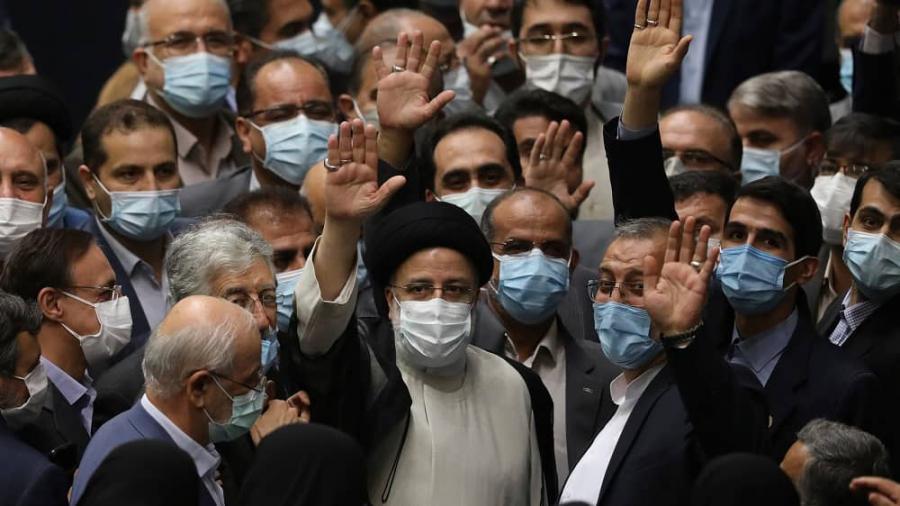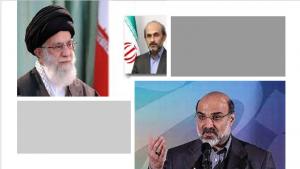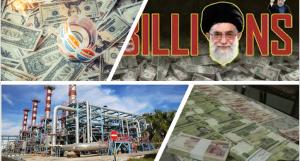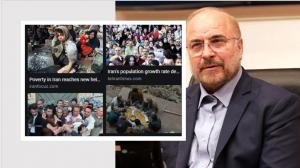
(Video) Iran’s Kleptocracy and Systematic Nepotism
The list of top positions occupied by woefully incompetent individuals is truly never-ending, and the aforementioned examples are just the tip of the iceberg.
PARIS, FRANCE, January 21, 2022 /EINPresswire.com/ -- In an analysis, the National Council of Resistance of Iran (NCRI) addressed corruption and nepotism within the regime's elite. Below is the full text of that analysis:
Economic corruption has been an international problem for centuries. But when it comes to Iran, the word “corruption” fails to portray the true misappropriation of public funds by the ruling theocracy. With its endemic nepotism and countless high-profile cases of embezzlement, the clerical regime is the true definition of a kleptocracy.
Transparency International’s 2020 Corruption Perception Index ranks Iran 145th out of 180 countries. The monarchy (the Shah’s regime) that ruled Iran before the mullahs were well-known for its nepotism and state corruption, earning it the nickname of “The Thousand Families” (Hezar Famil). But the mullahs’ regime, which hijacked the 1979 anti-monarchical revolution, has far exceeded the Shah’s economic mischief. Resorting to unbounded and shameless deceit, under the pretext of “combating corruption,” regime officials have established systematic nepotism.
Technological advances and broader access to education in the 21st century have enabled more citizens to be elected to political office, gradually strengthening meritocracy. But this is not the case in Iran under the mullahs’ regime.
The state-run Jahan-e Sanat daily mocked the regime’s nepotism in an article on January 17, saying: “They come in buses and occupy high positions, and the only thing that does not matter is merit. One cannot find criteria such as related education and degrees, background, and experience. Instead, we are just told about their positions and managerial titles.”
Since Ebrahim Raisi became the regime’s president last year, the already-dizzying trend of appointing officials’ relatives and family members to important positions has increased. Many observers consider the doling out of money and positions to individuals close to the Supreme Leader Ali Khamenei as a part of his policy to close ranks for his increasingly fragile regime.
Some notable cases of nepotism in recent months are listed below. Although these were readily acknowledged even by the regime’s own media outlets, on November 16, Raisi shamelessly claimed: “Nomination is based on competence and merit. Camaraderie, kinship, and media pressure do not affect my choice.”
Days after Raisi’s bogus claims, a classified letter by Raisi’s Minister of Petroleum Javad Owji was leaked, in which he ordered the Ministry’s human resources department to hire Nafiseh Sangdovini, the daughter of Ramazan Ali Sangdovini, a parliamentary deputy close to Raisi.
Minister of Health Bahram Einollahi appointed his son-in-law as an adviser even though he has absolutely no experience or expertise in the area for which he is expected to impart wisdom.
According to Al-Monitor, which is linked to Tehran, “Labor Minister Hojjatullah Abdul Maleki has appointed his wife’s brother as his own special adviser. Zanib Kadkhoda, a cousin of Raisi, has recently been appointed Dean of the Faculty of Dentistry at the University of Tehran. Also, Meysam Nili, the brother of Raisi’s son-in-law, recently started at the official news agency IRNA as a key member of its high council.”
“The latest case [of nepotism] is that of Mehdi Rahimi, a relative of Farid Haddad Adel. Rahimi became the director of public relations at the President’s Office even though he only has a high school diploma. This is rather normal when a Maddah [religious singer] becomes the deputy of Tehran’s mayor for promoting literacy,” Jahan-e Sanat daily wrote on January 17.
Raisi himself became president with a sixth-grade education and no background in executive leadership. In reality, Raisi is a crime against humanity who has the blood of over 30,000 political prisoners on his hands. During the horrendous 1988 genocide in Iran, he was a member of the so-called “Death Committees,” which sent thousands of innocent prisoners to the gallows for advocating freedom and democracy. For Iran’s ruling kleptocracy, involvement in crimes against humanity and complete fealty to the Supreme Leader stands above all other criteria, including competence.
In another case, Alireza Zakani, the current mayor of Tehran, appointed his son-in-law, Hossain Heydari, as his special advisor. Due to intense public condemnation, however, he was forced to back off of the decision.
The Iranian Resistance, in an exclusive report on the regime’s internet censorship bill, revealed how Zakani’s daughter and her husband will stand to profit substantially from the regime’s plan to force international social media platforms out of Iran.
“By forcing international social medial platforms out of Iran, companies like Sharif Amid Computer Company will take over the market. This company is headed by Maryam Zakani, daughter of Tehran’s Mayor Alireza Zakani, and her husband Hossain Heydari. Heydari also works in Arsh Ideographer Company, another application-developing company, whose most prominent application is ‘Rubika,’” the report reads.
“By order of the Minister of Science, Mohammad Hadi Zahedi, the son of Mohammad Mehdi Zahedi, the former Minister of Science and current member of parliament, has been appointed Director-General of Statistics, Information Technology and Cyberspace Security at the Ministry of Science,” the state-run Mehr news agency reported on January 11.
Parviz Fattah, the head of the Mostazafan Foundation, appointed Heshmatollah Ghanbari, a key propagandist on the regime’s radio and television organization (IRIB), as the head of the Persian Tourism and Recreation Centers Holding. Ghanbari has also been a deputy director of resource development.
“Heshmatollah Ghanbari was appointed as the managing director of a tourism holding without even a single day of management experience. Everywhere you look in the country, we see such appointments,” the state-run Aftab-e Yazd daily acknowledged on January 12.
Abdul Ali Asgari, the former head of the state-run TV and radio and a close associate of Khamenei, was installed as the CEO of the country’s largest petrochemicals company. The appointment caused a steer even within the regime itself.
“Those who, through a hidden lobby, appointed Asgari to the post of director of Radio and Television and tried to retain the most incompetent director of Radio and Television, have now brought him to the Persian Gulf Petrochemical Holding. I’m sure [Khamenei] is having a hard time with this,” Hamid Rasaei, a former MP from Khamenei’s faction acknowledged.
The state-run Dideban website reported on January 11 that Pir Hossein Kolivand, the head of the regime’s Red Crescent Society, appointed an IRGC commander, Yaghoub Soleimani, as Iran’s Red Crescent secretary-general. Raisi had appointed Kolivand himself in November 2021.
“Yaghoub Soleimani replaces Mohammad Hassan Qousian Moghaddam, even though he has no experience related to the Red Crescent on his record,” Dideban acknowledged.
Nepotism is not limited to the regime’s ruling faction. The self-described “reformist” president of the regime, Hassan Rouhani, had appointed his son-in-law as head of Iran’s geological survey, for example. Rouhani had also appointed his brother as his “special advisor.” The brother, Hossein Fereydoon, was later arrested by the rival faction, but now enjoys a comfortable life in prison and frequently goes on furlough. Meanwhile, many Iranian political prisoners are deprived of the most basic medical attention and lose their lives as a result.
“Gentlemen on both factions speak of competence and meritocracy before the elections, but when they are in power, they replace competence with family relationships,” wrote the state-run Jomhouri-e Eslami daily in November 2021.
The list of top positions occupied by woefully incompetent individuals is truly never-ending, and the aforementioned examples are just the tip of the iceberg.
What else can be expected of a regime that has a corrupt and incompetent murderous “Supreme Leader” like Khamenei, who according to a Reuters report back in 2013, controls a vast financial empire worth at least $95 billion (9 years ago)?
While most Iranians cannot earn even a decent living and are deprived of staples like bread while being forced to spend the night sleeping on buses or empty graves, the ruling kleptocracy continues to plunder public funds. Since its foundation, the mullahs’ regime has been firmly based on systematic corruption and mindboggling nepotism.
Mohammad Bagher Ghalibaf, the regime’s current Parliament Speaker, acknowledged in 2016 that “only 4% of society” have a decent life in Iran. They are regime officials and their relatives.
Meanwhile, more and more Iranians are forced to go to Iraq to sell their kidneys, according to Hossein Biglari, head of a support institution for kidney patients in Kermanshah. “Many people go to Tehran to sell their kidneys because brokers there help them get higher prices. But regulations forbid buying an organ from people who don’t reside in the same city,” Biglari said on January 15.
Khamenei, who now sits on the throne thanks to the 1979 revolution that toppled the Shah, is perfectly aware that the resort to nepotism to help him steer through multiple crises at home and abroad is futile. But the mullahs’ 43 years of authoritarian rule has taught him that fear is of more use to him than respect. That he installed a literally illiterate IRGC soldier Ebrahim Raisi to the presidency, is a perfect indication of complete disregard for a merit-based system of governance.
The supreme leader wants to make sure his regime survives. But blinded by his greed for power, just like any other dictator like the Shah, he himself is making the biggest mistake; underestimating the Iranian people’s determination to overthrow his regime.
Shahin Gobadi
NCRI
+33 6 51 65 32 31
email us here
Many Iranians go to Iraq to sell their kidneys, according to Hossein Biglari, head of the support group for kidney patients in Kermanshah.
EIN Presswire does not exercise editorial control over third-party content provided, uploaded, published, or distributed by users of EIN Presswire. We are a distributor, not a publisher, of 3rd party content. Such content may contain the views, opinions, statements, offers, and other material of the respective users, suppliers, participants, or authors.






